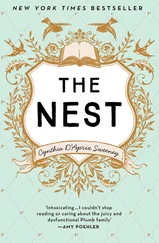MELODY KNEW NORA AND LOUISAcalled her the General behind her back, but she didn’t care. She didn’t care because she also knew what it was like to grow up in a state of anarchy, in a house with parents so hands-off they were nearly invisible. Melody knew what it was like to have teachers ask, hesitant and concerned, if her parents were going to come to a parent-teacher conference. She knew what it was like to search in vain for their faces in the school auditorium during a play or a concert. She’d vowed to be an entirely different type of mother, and having twins never set her off course. Some days she drove herself crazy, running from one daughter’s after-school activity to the other’s. She charted the time spent with each child, making sure to even it out as far as was humanly possible. She never missed a single concert, play, soccer game, track meet, Brownie meeting, choral performance. She packed a healthy lunch every day, including one indulgent sweet on Fridays. She wrote them encouraging notes and arrived fifteen minutes early for pickup, so they would never stand in a parking lot alone, wondering if anyone was going to show up to bring them home, wondering if anyone even realized they were gone.
She remembered their first exploratory trips upstate as if they’d happened yesterday. Driving north, watching the scraggly city trees gradually replaced with the stately elms and elderly pines of the Taconic. Nora and Louisa asleep in their respective car seats in the back, both sucking away on identical pacifiers. Melody had instantly loved their small village with its quaint dress shops and bakeries, all the women pushing strollers while wearing jogging suits the color of sorbet. It was nothing like the grime and cacophony of their street that was technically in Spanish Harlem.
They rented a condo on the less desirable side of town. For two straight years Melody would put the twins in a stroller and walk the streets on the other side of the tracks, literally. The commuter train divided the town into its desirable (nearer the water) and less desirable (nearer the mall) side. She didn’t know what she was looking for until the day she saw it. A small house that had managed to survive the kind of gut renovation and expansion happening on most of the surrounding streets. It was an Arts and Crafts bungalow that had clearly fallen into disrepair. The morning she passed by, a man about her age was loading a car with boxes.
“Moving out?” Melody said, trying to sound friendly but not overly curious.
“Moving my mom out,” the guy said; he was staring at the girls as people tended to do. “Twins?”
“Yes,” Melody said. “They’re almost three.”
“I have twins, too.” He leaned down in front of the stroller and played with the girls for a minute, pretending to snatch a nose and then hand it back, one of their favorite games.
“So what’s going to happen to the house?” Melody asked.
The man stood and sighed. He squinted at the house. “I don’t know, man,” he said, sounding beaten. “There’s so much to do to get it in good shape to sell. The Realtor says it’s not even worth the work, someone will probably tear it down and rebuild into something like that.” He pointed disgustedly to the house next door, a renovation Melody had watched — and secretly admired — over the past months.
“Yeah, that place is pretty awful,” she said. And then without thinking: “My husband and I have been looking for a house, but everything is so much bigger than we need — and can afford. I’d love to find something to fix up, not to change but to restore.” Once the words were out of her mouth, she knew they were true.
Walt had been against the house. He thought it was overpriced for what it was and feared a real-estate downturn. The seller liked Melody, but even with all the work the house needed — and it needed everything — he held firm on the price, which was more than they should borrow given that she didn’t work. (Her working had never been worth the price of child care and now who would hire her?) Walt’s salary as a computer technician in Pearl River was okay but not great.
The house’s interior was dated, but Melody could see past the ugly carpet and ’70s wallpaper to its excellent bones and understand what it could be: a home, a place her girls would feel safe and cared for. She loved the tiny leaded glass windows, the breakfast nook, the window seat at the landing of the front stair, the enormous oak in the front yard and the sugar maples in the back turning brilliant shades of orange. She and Walt would take the front bedroom, the one under the eaves. There were two small bedrooms in the back, perfect for Nora and Louisa. She could see birthday parties in the yard under the maples, early morning breakfasts in the paneled dining room; she knew exactly where she’d put the Christmas tree. The Realtor had pulled up a corner of the living room carpet to show Melody the original heart pine floor. She fought for that house in a way she’d never fought for anything before.
“All the mechanicals are going to need an upgrade,” Walt had said, frowning. “Any money we have is going to go behind the walls, in the basement, under the floors — we’ll drain our savings for things you can’t see.”
“That’s okay,” Melody said. And it was. She knew how to do the other stuff, how to strip paint and steam off wallpaper and refinish. What she didn’t know she’d learn. The house would be her project, her job. Alan Greenspan was on her side! And Walt couldn’t argue with the concrete fact of The Nest.
But he did. For weeks. And when she thought they’d waited too long and the property would go to someone else, she’d broken out into head-to-toe hives. She’d been soaking in a tub of colloidal oatmeal, bereft, when he’d come to her to tell her the property — and hefty mortgage — was theirs. She knew his capitulation had finally come down to this: He loved her, he wanted her to be happy.
“Why can’t we move to a town where everyone isn’t a gazillionaire?” Walt would say to her every so often, usually when Melody was in a tizzy about something the girls needed — clothes, after-school activities, summer camp. But she didn’t want to move. They lived in one of the best school districts in the Northeast. Melody had learned where to shop, how to poke around for what the girls needed. She knew how to wait for sales and who would take money off when she said she was buying for twins. She always came up with funds when necessary — for special school trips or instruments so they could take music lessons. When they joined the ski club, she’d paged through old school directories and called parents of twins who’d gone off to college asking if they had any equipment they would be willing to sell and she hit the jackpot, a bored-sounding father who told her if she’d come clean his garage of ski equipment — along with the ice skates and tennis rackets and bikes that his daughters never, ever touched — she could have it all for free.
Through all the years, the coupon cutting, working on the house every weekend until her knees ached and her hands were cracked and bleeding, rarely buying anything new for herself — or Walt — off in the distance her fortieth birthday glowed like a distant lighthouse, flashing its beam of rescue. She would turn forty and the money would drop into their account. Most of it would go toward college and some of it would pay down the house loan and all would be, if not completely right with the world, better than it ever had been. She didn’t like to think about the year the girls would go away to college, how she would feel without them, but she did allow herself to think about how things might get a little easier for all of them after The Nest. Finally, the girls could have something that wasn’t about price. They could line up the college acceptance letters and Melody could say, Whichever one you want. Choose. Finally, she could start to relax. Finally, she was going to get a goddamn break.
Читать дальше
Конец ознакомительного отрывка
Купить книгу












